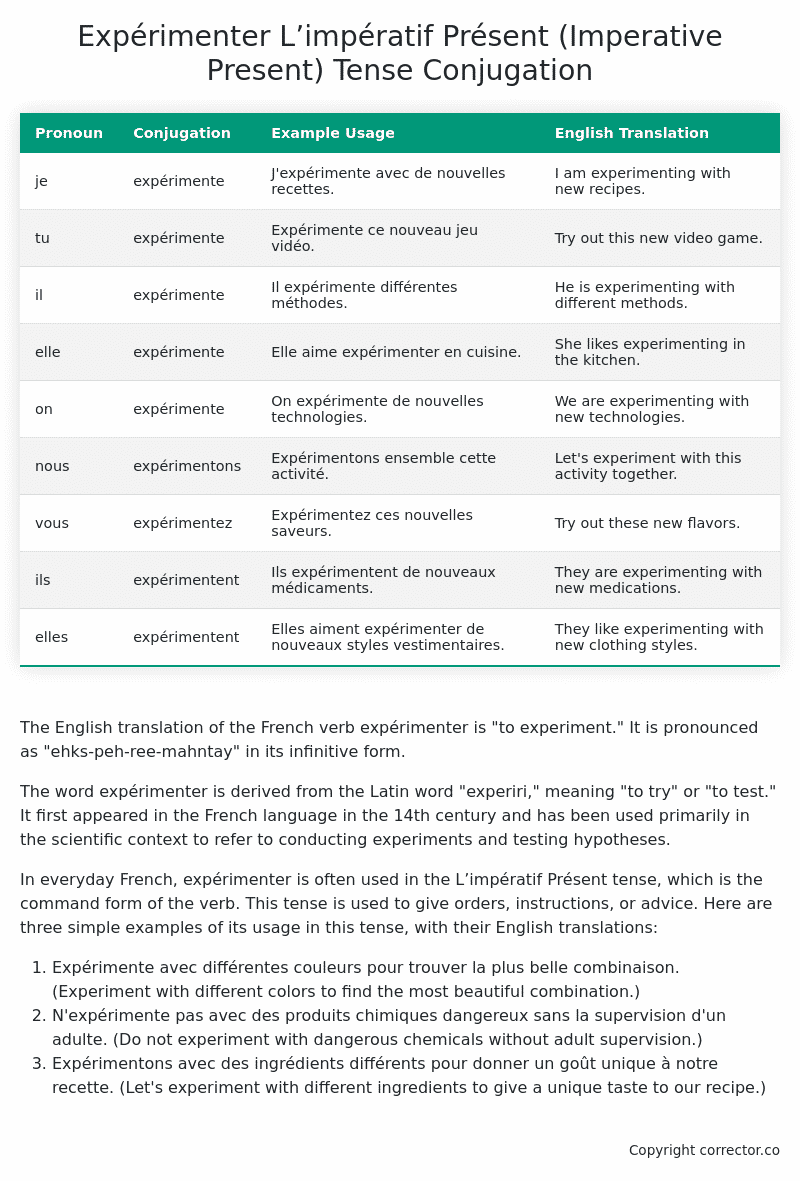L’impératif Présent (Imperative Present) Tense Conjugation of the French Verb expérimenter
Introduction to the verb expérimenter
The English translation of the French verb expérimenter is “to experiment.” It is pronounced as “ehks-peh-ree-mahntay” in its infinitive form.
The word expérimenter is derived from the Latin word “experiri,” meaning “to try” or “to test.” It first appeared in the French language in the 14th century and has been used primarily in the scientific context to refer to conducting experiments and testing hypotheses.
In everyday French, expérimenter is often used in the L’impératif Présent tense, which is the command form of the verb. This tense is used to give orders, instructions, or advice. Here are three simple examples of its usage in this tense, with their English translations:
- Expérimente avec différentes couleurs pour trouver la plus belle combinaison. (Experiment with different colors to find the most beautiful combination.)
- N’expérimente pas avec des produits chimiques dangereux sans la supervision d’un adulte. (Do not experiment with dangerous chemicals without adult supervision.)
- Expérimentons avec des ingrédients différents pour donner un goût unique à notre recette. (Let’s experiment with different ingredients to give a unique taste to our recipe.)
Table of the L’impératif Présent (Imperative Present) Tense Conjugation of expérimenter
| Pronoun | Conjugation | Example Usage | English Translation |
|---|---|---|---|
| je | expérimente | J’expérimente avec de nouvelles recettes. | I am experimenting with new recipes. |
| tu | expérimente | Expérimente ce nouveau jeu vidéo. | Try out this new video game. |
| il | expérimente | Il expérimente différentes méthodes. | He is experimenting with different methods. |
| elle | expérimente | Elle aime expérimenter en cuisine. | She likes experimenting in the kitchen. |
| on | expérimente | On expérimente de nouvelles technologies. | We are experimenting with new technologies. |
| nous | expérimentons | Expérimentons ensemble cette activité. | Let’s experiment with this activity together. |
| vous | expérimentez | Expérimentez ces nouvelles saveurs. | Try out these new flavors. |
| ils | expérimentent | Ils expérimentent de nouveaux médicaments. | They are experimenting with new medications. |
| elles | expérimentent | Elles aiment expérimenter de nouveaux styles vestimentaires. | They like experimenting with new clothing styles. |
Other Conjugations for Expérimenter.
Le Present (Present Tense) Conjugation of the French Verb expérimenter
Imparfait (Imperfect) Tense Conjugation of the French Verb expérimenter
Passé Simple (Simple Past) Tense Conjugation of the French Verb expérimenter
Passé Composé (Present Perfect) Tense Conjugation of the French Verb expérimenter
Futur Simple (Simple Future) Tense Conjugation of the French Verb expérimenter
Futur Proche (Near Future) Tense Conjugation of the French Verb expérimenter
Plus-que-parfait (Pluperfect) Tense Conjugation of the French Verb expérimenter
Passé Antérieur (Past Anterior) Tense Conjugation of the French Verb expérimenter
Futur Antérieur (Future Anterior) Tense Conjugation of the French Verb expérimenter
Subjonctif Présent (Subjunctive Present) Tense Conjugation of the French Verb expérimenter
Subjonctif Passé (Subjunctive Past) Tense Conjugation of the French Verb expérimenter
Subjonctif Imparfait (Subjunctive Imperfect) Tense Conjugation of the French Verb expérimenter
Conditionnel Présent (Conditional Present) Tense Conjugation of the French Verb expérimenter
Conditionnel Passé (Conditional Past) Tense Conjugation of the French Verb expérimenter
L’impératif Présent (Imperative Present) Tense Conjugation of the French Verb expérimenter (this article)
L’infinitif Présent (Infinitive Present) Tense Conjugation of the French Verb expérimenter
Struggling with French verbs or the language in general? Why not use our free French Grammar Checker – no registration required!
Get a FREE Download Study Sheet of this Conjugation 🔥
Simply right click the image below, click “save image” and get your free reference for the expérimenter L’impératif Présent tense conjugation!

Expérimenter – About the French L’impératif Présent (Imperative Present) Tense
Usage
Giving commands
Making requests
Offering advice
Expressing desires
Conjugation Formation
Interactions with other tenses
Want More?
I hope you enjoyed this article on the verb expérimenter. Still in a learning mood? Check out another TOTALLY random French verb conjugation!


